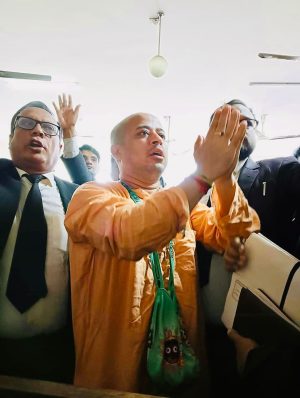The imprisonment of former ISKCON leader and current spokesperson of Sammilita Sanatani Jagaran Jote, Chandan Kumar Dhar aka Chinmoy Krishna Das Brahmachari on November 26 has triggered a fresh wave of unrest in Bangladesh.
Das has been jailed on charges of sedition. According to reports, he has been accused of disrespecting Bangladesh’s national flag. Meanwhile, various political, religious, and student groups in Bangladesh are calling for a ban on ISKCON, a global Hindu organization that aims to spread the teachings of the Hindu deity Krishna.
ISKCON-Bangladesh has sought to distance itself from Das. It clarified that he was expelled from the organization for disciplinary violations.
In a statement, General Secretary Charu Chandra Das Brahmachari denied the organization’s involvement in the Sammilita Sanatani Jagaran Jote’s activities. Misleading propaganda is falsely linking ISKCON to Chinmoy Krishna Das and the recent protests, it said. It urged the public to distinguish between the two entities.
The sedition complaint against Das and 18 others was filed at a police station in Chittagong by a local leader of the Bangladesh Nationalist Party (BNP), after the Hindu community organized a rally in Chittagong’s New Market area. When the Chittagong Metropolitan Magistrate’s Court denied Das bail and ordered his imprisonment, chaos erupted.
When Das greeted his followers from inside the van transporting him to the jail, his supporters went on a rampage. They punctured the tires of the van, blocked roads for several hours and clashed with the police. Law enforcement officials used sound grenades and batons to disperse the crowd, which retaliated by pelting bricks and engaging in vandalism, injuring several people and damaging nearby properties.
During the clashes, Assistant Prosecutor Saiful Islam was brutally murdered, allegedly by Das’ followers. The killing triggered anger across Bangladesh. Netizens expressed outrage over the killing, fearing it might escalate into communal violence. Calls for Das’ immediate release from his supporters, combined with demands for justice for Islam’s death, have heightened communal tensions nationwide.
As the controversy unfolds, public sentiment in Bangladesh is increasingly leaning toward banning ISKCON. While ISKCON is known for its global charitable initiatives like “Food for Life” in over 150 countries, it has faced allegations of misconduct, including child abuse in its U.S.-based gurukulas in the 1980s and 1990s, cult-like behavior, and internal disputes in India over leadership and doctrine.
In Bangladesh, Islamist groups like Hefazat-e-Islam accuse ISKCON of destabilizing the country, disrespecting national symbols, and inciting religious tensions. Mamunul Haque, joint secretary general of Hefazat-e-Islam, has warned of street protests if the government does not act, stating, “ISKCON must be banned immediately; otherwise, Hefazat-e-Islam will ensure security for Hindus if the state fails to do so.”
The Anti-Discrimination Student Movement, which led the July-August student uprising that toppled Sheikh Hasina’s 15-year autocratic rule, has also called for ISKCON’s ban. The group claims ISKCON acts as an agent of Delhi’s agenda, undermining Bangladesh’s sovereignty. Its convener, Hasnat Abdullah, accused the organization of being complicit in Saiful Islam’s murder and warned of renewed protests if ISKCON’s activities are not curtailed.
As for the BNP, it appears to be divided in its approach to the evolving crisis. Khan’s filing of a sedition case against Das and calls for a ban on ISKCON from a section of the party suggest that the BNP believes that ISKCON misuses minority rights protections to interfere in national matters. However, a day after Khan filed the sedition charges against Das, the BNP expelled Khan for filing the case without informing the party leadership.
Despite mounting pressure, the High Court has refrained from issuing an order to ban ISKCON. The court remarked that the government must prioritize law and order while safeguarding lives and property. The court was informed that authorities have filed three cases related to Saiful Islam’s murder and ISKCON’s alleged activities, with 33 individuals already arrested.
The growing controversy reflects the increasing complexity related to religion, nationalism, and politics in Bangladesh. With increased public demands to ban ISKCON, the dual task of the government includes the maintenance of communal harmony along with resistance to extra-government pressures. Whether the issue gets resolved through legal proceedings or continues to escalate further remains uncertain, its implications for Bangladesh’s sociopolitical landscape are profound.
Meanwhile, India’s Hindu majoritarian Bharatiya Janata Party (BJP)-led government responded strongly to Das’ arrest. The Ministry of External Affairs expressed concern about minority rights in Bangladesh. BJP leaders in the eastern state of West Bengal, which borders Bangladesh, threatened border blockades and protests outside Bangladesh’s Deputy High Commission in Kolkata. Condemning the treatment meted out to Das, they called for his release.
The Bangladeshi government has issued a strong rebuke, marking a rare instance of direct pushback against India’s stance on its internal affairs. A Ministry of Foreign Affairs spokesperson emphasized that the Das case is a domestic legal matter and reaffirmed Bangladesh’s commitment to upholding minority rights and the rule of law while rejecting undue external pressure. This marks a significant departure from Bangladesh’s traditionally cautious diplomacy with India, signaling a more assertive approach to bilateral relations.
On November 28, West Bengal Chief Minister Mamata Banerjee expressed her concerns about the ongoing situation in Bangladesh. However, she was cautious, noting that what was happening in Bangladesh was an internal matter of another country. Additionally, “the matter was for the central government to resolve, and her state government would comply with whatever decision was made,” she said.

































